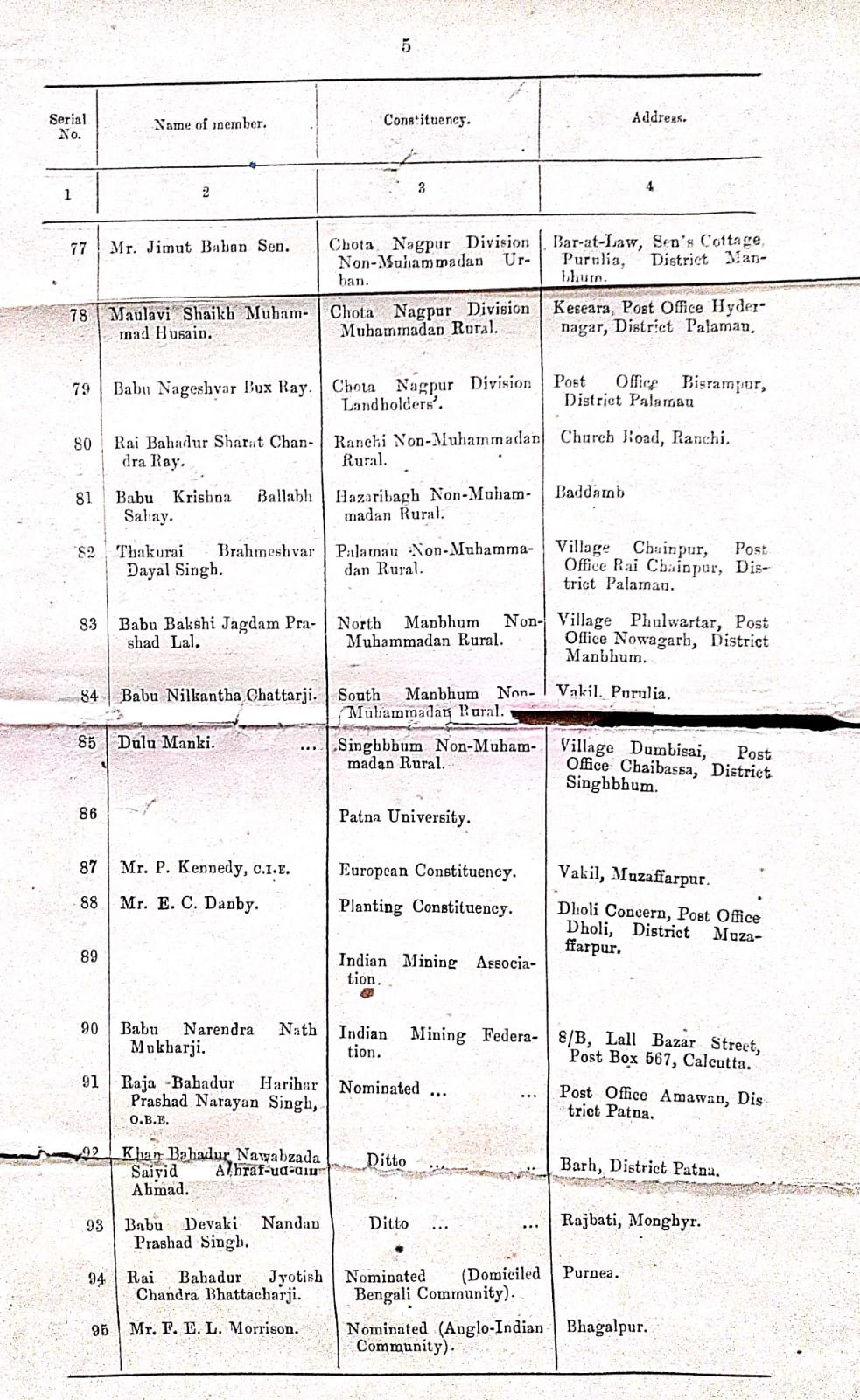बी. पी. मंडल, अध्यक्ष, पिछड़ा वर्ग आयोग, का अग्रेषित पत्र।
दिनांक: 31 दिसंबर, 1980
आदरणीय राष्ट्रपतिजी,
सर्वशक्तिमान ईश्वर की कृपा से यह रिपोर्ट आपके समक्ष प्रस्तुत करने का सौभाग्य मुझे प्राप्त हुआ है।
2. 20 दिसंबर, 1978 को, भारत के तत्कालीन प्रधान मंत्री, श्री मोरारजीभाई ने संसद के पटल पर मेरी अध्यक्षता में चार अन्य सदस्यों के साथ पिछड़ा वर्ग आयोग नियुक्त करने के निर्णय की घोषणा की। वे थे : श्री दीवान मोहन लाल, श्री आर. आर. भोले, श्री दीना बंधा साहू और श्री के. सुब्रमण्यम। संदर्भ की शर्तों की घोषणा सदन के पटल पर भी की गई थी।
3. हमारे एक सदस्य, श्री दीन बंधु साहू, स्वास्थ्य के आधार पर 5 नवंबर, 1979 को अपनी सदस्यता से इस्तीफा दे दिया। 7 अक्टूबर, 1980 को वे इस दुनिया से चल बसे। काम के बीच में ही उनकी बहुमूल्य सेवाओं को खो देने का हमें खेद है। उनके इस्तीफे के कारण हुई रिक्ति को श्री एल आर नाइक को नियुक्त करके भरा गया था।
4. हमने 21 मार्च, 1979 को भारत के प्रधान मंत्री श्री मोरारजीभाई देसाई के उद्घाटन भाषण के बाद अपना काम शुरू किया और 12 दिसंबर, 1980 को भारत के प्रधानमंत्री श्रीमती इंदिरा गांधी समापन भाषण के साथ समाप्त हुआ।
5. यह उल्लेख किया जा सकता है कि यद्यपि यह आयोग पिछली जनता सरकार द्वारा नियुक्त किया गया था, श्रीमती इंदिरा गांधी की सरकार ने न केवल दो एक्सटेंशन दिए बल्कि हमारे काम के निर्वहन में सभी समर्थन और सहयोग दिया। यह स्पष्ट रूप से उनके समाज के दबे कुचले, लाचार और उत्पीड़ित लोगों के प्रति उनकी अनुराग और प्रतिबद्धता को दर्शाता है।
6. आयोग को अपना काम करने में कई कठिनाइयों और चुनौतियों का सामना करना पड़ा, जैसे जुलाई 1979 में लोकसभा का विघटन, उसके बाद मार्च 1980 में नौ राज्य विधानसभाओं का विघटन। इससे आयोग के काम को धीमा करना पड़ा। आयोग को तीन विस्तार मिले, पहला 1 जनवरी से 31 मार्च, 1980 तक तीन महीने के लिए और दो और विस्तार 1 अप्रैल से 30 सितंबर और 1 अक्टूबर से 31 दिसंबर, 1980 तक। इन सभी कठिनाइयों और समय की कमी के बावजूद, कमीशन ने दो साल से भी कम समय में अपना काम पूरा कर लिया।
7. हमारा कार्य हमारे संदर्भ की शर्तों तक ही सीमित था जिसके अनुसार हमें "सामाजिक और शैक्षिक रूप से पिछड़े वर्गों को परिभाषित करने के लिए मानदंड निर्धारित करना था" और "इस संदर्भ में पहचाने गए "नागरिकों के सामाजिक और शैक्षिक रूप से पिछड़े वर्गों की उन्नति के लिए उठाए जाने वाले कदमों की सिफारिश करना" । तदनुसार, हमने ऐसे वर्गों की पहचान के लिए मानदंड निर्धारित किए हैं और उनके उत्थान के लिए उठाए जाने वाले कदमों की सिफारिश की है। अनुच्छेद 15(4) और 16(4) के अर्थ के तहत सामाजिक और शैक्षणिक रूप से पिछड़े वर्गों के लिए आरक्षण की अधिकतम मात्रा के संबंध में उच्चतम न्यायालय द्वारा निर्धारित आवश्यक कानून को भी हमारी रिपोर्ट में ध्यान में रखा गया है।
8. हमारी रिपोर्ट, हालांकि, राज्य, यदि कमजोर वर्गों जैसे महिलाओं और गरीबों और अन्य लोगों के उत्थान के लिए कोई उपाय करना चाहते हैं, जो हमारे संदर्भ की शर्तों में शामिल नहीं हैं. तो यह रिपोर्ट उनके रास्ते में नहीं आती है। यह ध्यान दिया जा सकता है कि उनके लिए और अधिक आरक्षण करने पर कोई रोक नहीं है। उदाहरण के लिए, कर्नाटक सरकार ने सामाजिक और शैक्षिक रूप से पिछड़े वर्गों के लिए 48% सीटें आरक्षित की हैं, जिनमें अनुसूचित जाति, अनुसूचित जनजाति और अन्य पिछड़ा वर्ग शामिल हैं और अन्य कमजोर वर्गों के लिए 18% से अधिक सीटें निर्धारित की गई हैं। उस सरकार के कुल 66% आरक्षण को न्यायपालिका में चुनौती दी गई और उसे बरकरार रखा गया। हालांकि, अनुच्छेद 15(4) और 16(4) के तहत ओबीसी के लिए आरक्षण सुभाषिनी बनाम राज्य (AIR 1966 Mys 401) में किसी अन्य मानदंड से संबंधित किसी भी अन्य आरक्षण के साथ सम्मिलित नहीं किया जाना चाहिए, यह "आरक्षण की वैधता" के लिए निर्धारित किया गया था। सामाजिक और शैक्षणिक रूप से पिछड़े वर्ग, एससीएस और एसटीएस के अलावा अन्य वर्गों को अनुच्छेद 14 की आवश्यकता के आधार पर परीक्षण करना था। इस तरह के आरक्षण को अनुच्छेद 15(4 )के तहत विशेष आरक्षण के साथ नहीं जोड़ा जाना चाहिए। बालाजी मामले में निर्धारित ऊपरी सीमा, केवल अनुच्छेद 15(4) के तहत किए जाने वाले आरक्षण के लिए आवेदन किया है। 11 में अन्यथा किए गए किसी भी आरक्षण को शामिल नहीं किया गया है। कुछ उत्तरी राज्यों में आरक्षण का छोटा प्रतिशत भी सामाजिक और शैक्षिक रूप से पिछड़े वर्गों के लोगों तक नहीं पहुंच रहा है, जैसा कि अनुच्छेद 15(4) और 16(4) के तहत इस तरह के जुड़ाव के कारण विचार किया गया है।
9. भारत के कोने-कोने में हमारे व्यापक दौरे के आधार पर, आम जनता से मिली प्रतिक्रिया के आधार पर, मैं यह कहना चाहूंगा कि इस देश के पिछड़े वर्ग हमारी सिफारिशों पर सरकार की सकारात्मक प्रतिक्रिया से बहुत उम्मीदें रखते हैं। हमारे सामने सही आशंका व्यक्त की गई थी कि अगर मेरे आयोग की रिपोर्ट का भी काका कालेलकर के आयोग के समान हश्र होता है, तो सामाजिक और शैक्षिक रूप से पिछड़े वर्गों की वैध आशाएं और आकांक्षाएं, जो आबादी का एक बड़ा हिस्सा हैं, समाप्त हो जाएंगी और उनका वाजिब हक़ मिटटी में समा जाएगी।
10. 1931 की जनगणना के बाद जाति गणना के आंकड़ों के अभाव में हमें भारी कठिनाइयों का सामना करना पड़ा। भविष्य में ऐसी कठिनाइयों से बचने के लिए मेरे द्वारा इस संदर्भ दिया गया 15 जून, 1979 और 18 अगस्त 1979 के पत्र , क्रमशः सर्वश्री एच.एम. पटेल और वाई.बी. चव्हाण को संबोधित किया गया था। मैंने 31 मार्च, 1980 के अपने पत्र में इस आशय के गृह मंत्री ज्ञानी जैल सिंह से भी अनुरोध किया था। मुझे सूचित किया गया था कि यह निर्णय लिया गया था कि 1981 की जनगणना के दौरान जाति गणना नहीं की जाएगी और यह कि वर्तमान भारतीय जनगणना में जाति की गणना नहीं किये की निति जारी रहेगी, जिस पर पुनर्विचार की आवश्यकता है।
11. हम आपको एक सर्वसम्मत रिपोर्ट प्रस्तुत करने की उम्मीद कर रहे थे और आयोग के सभी सदस्य इस बिंदु पर सहमत थे। अंतिम क्षण में जब रिपोर्ट पर हस्ताक्षर होने वाले थे, सदस्यों में से एक श्री एल.आर. नाइक ने असहमति का एक मिनट दर्ज करने का फैसला किया और यह रिपोर्ट का खंड VII बनता है।
12. श्री नाइक का मुख्य तर्क यह है कि अन्य पिछड़े वर्गों की राज्य-वार सूची को दो भागों में विभाजित किया जाना चाहिए: एक मध्यवर्ती पिछड़े वर्गों से संबंधित और दूसरा अति पिछड़े वर्गों से संबंधित। अति पिछड़े वर्गों के तहत, उन्होंने उन जातियों को समूहबद्ध किया है, जो उनके अनुसार, पिछड़े वर्गों के सबसे वंचित और लाचार वर्ग हैं। उनका तर्क है कि उन्हें लाभ और लाभ के उद्देश्यों के लिए एक अलग इकाई के रूप में माना जाना चाहिए। रिपोर्ट में अनुशंसित समूह पर इनका मानना है कि इन दो श्रेणियों को मिलाने से कोई सकारात्मक परिणाम नहीं निकलेगा। इन दो समूहों को लाभ का असमान वितरण होना चाहिए।
13. जबकि आयोग श्री नाइक के तर्क के बिंदु को देखते हुए मानता है की उनके दृष्टिकोण को स्वीकार करने से ऐसी स्थिति उत्पन्न होगी जो संविधान के अनुच्छेद 15(4) के प्रतिकूल है। मैसूर के बालाजी वी राज्य के मामले में सर्वोच्च न्यायालय ने स्पष्ट रूप से कहा है कि "पिछड़े वर्गों की दो श्रेणियों को पेश करने में, जो आदेश लागू किया गया है, उसका सार यह है कि उन सभी वर्गों के नागरिकों के लिए उपाय तैयार करना है जो उनकी तुलना में कम उन्नत हैं। राज्य में सबसे उन्नत वर्ग, और यह, हमारी राय में, अनुच्छेद 15 (4) का दायरा नहीं है"। यह अवलोकन कई अन्य मामलों में दोहराया गया है और। अब तक, यह स्थापित कानून बन गया है। इसे देखते हुए, अन्य पिछड़े वर्गों को दो श्रेणियों में विभाजित करने के श्री नाइक के विचार से सहमत होना आयोग के लिए संभव नहीं था।
14. इसके अलावा, श्री नाईक द्वारा तैयार किए गए तथाकथित अति पिछड़े वर्गों की जनसंख्या की वैधता का कोई आधार नहीं हैं और शुद्ध अनुमान पर आधारित हैं।
15. यह भी बताया जा सकता है कि श्री नाइक ने इस तथ्य के बावजूद उपरोक्त बिंदु को अपनाना उचित समझा है हलांकि इससे पहले 10 से 14 नवंबर, 1980 तक, उन्होंने ओबीसी की राज्य-वार सूची के प्रत्येक पृष्ठ पर हस्ताक्षर किए थे, जो ओ.बी.सी. अन्य सभी पिछड़ा वर्ग एक समूह के रूप में मानता है ।
16. इस पत्र को समाप्त करने से पहले। यदि मैं इस रिपोर्ट को अंतिम रूप देने के लिए कड़ी मेहनत करने वाले अपने सहयोगियों के प्रति आभार व्यक्त नहीं करता तो मैं अपने कर्तव्य से चूक जाऊंगा। आयोग में अन्य पिछड़ा वर्ग के सदस्य और अनुसूचित जाति से एक श्री एल आर नाइक शामिल थे। श्री दीवान मोहन लाल. जो हमारे बीच सबसे बड़े हैं, अपना बहुमूल्य योगदान देने में कभी पीछे नहीं रहे और आयोग को उनकी उम्र के ज्ञान और उनके जीवन के विशाल अनुभव का लाभ मिला है। श्री न्यायमूर्ति आर आर भोले सांसद विधायिका और न्यायपालिका तथा भारत के ग्रामीण और शहरी जीवन का विविध अनुभव था, जो आयोग के लिए बहुत मददगार था। श्री के. सुब्रमण्यम, एक बुद्धिमान और अनुभवी व्यक्ति थे, जिनके पास पत्रकारिता के अलावा ग्रामीण जीवन का विविध अनुभव था और जो दलितों की सेवा के लिए समर्पित थे, उन्होंने आयोग में बहुमूल्य योगदान दिया था। कई महीनों के अंतराल के बाद आयोग में नियुक्त किए गए श्री एल.आर. नाईक हमारे समूह के सबसे मेहनती सदस्य थे। जब अन्य सदस्य देश के व्यापक दौरे को जारी रखने के लिए थक जाते थे, तो वह हमेशा बिना थके काम करते रहते थे।
17. मुझे यह रिपोर्ट आपको प्रस्तुत करने का सौभाग्य प्राप्त हुआ है और आशा है कि आपको हमारी सिफारिशों को स्वीकार करने में कोई संकोच नहीं होगा और हमारे देश के सामाजिक और शैक्षिक रूप से पिछड़े वर्गों की लंबे समय से चली आ रही शिकायतों का निवारण होगा।
सस्नेह,
सादर,
हस्ताक्षर /-
(बी. पी. मंडल)
सेवा में ,
श्री नीलम संजीव रेड्डी,
भारत के राष्ट्रपति।
राष्ट्रपति भवन,
नयी दिल्ली।


















